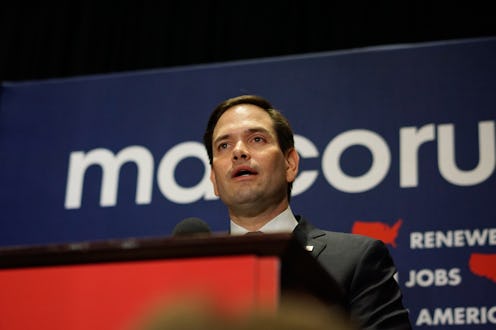News
The Reasons Why Marco Rubio Didn't Win
America's in the middle of a real political storm — a tsunami, even! — and it just took out Marco Rubio. Of course, we all saw this one coming. But Rubio's speech Tuesday night implied that, somehow, he didn't see it coming, even as he suspended his campaign. Maybe it's not in God's plan for 2016, like he said, but it's more likely a worldly, here-on-Earth issue. His speech's storm analogy ("America is in the middle of a real political storm, a real tsunami, and we should have seen this coming") is not all that bad, except there's more to it than resentment and hate. There's a reason Rubio didn't win Florida.
It's the same reason he hasn't won a single state except Minnesota. Sure, he's from Florida, but the voters turning out this season are doing so for the same reason — it doesn't matter the state. They're dissatisfied with government, or even angry. In Florida, 85 percent of the voters said so on Tuesday. Those people vote for Trump. They feel betrayed by Republican politicians and want someone from outside the establishment.
Rubio is not their guy. There's more to his loss nationwide than just that, but the Florida loss is more a symptom of Rubio's bigger problems which led to his defeat.
He Has No Base
This has been Rubio's problem from the get-go. He planned to skip the early states and pick up votes down the line when the race thinned out and he could position himself as the candidate to coalesce around, being all things to all GOP voters. That didn't work. He had little to no ground game in the early stages of the campaign, which meant voters had no connection to him. Maybe they would vote for him in a general election, but there was nothing to turn them out in the meantime.
The only people he truly appeals to are Republicans who support immigration reform. The Group of Eight immigration deal is the closest thing he has to a political achievement in Washington. In Florida, this could have actually helped; 53 percent of GOP primary voters support offering immigrants working without papers a legal status. He could have exploited it against Trump in the state, but it would have cost him votes elsewhere. As is abundantly clear this year, most of America's Republicans are anti-immigration.
But even looking beyond immigration, there's no clear group he can appeal to. Cruz steals conservative votes and Kasich steals moderate votes. There is no ideological window between them for Rubio to exploit. No large group of people have views that clearly align with his, at least with Cruz and Kasich in the race.
It's The Populists' Year
Gloom and doom about the high level of authoritarianism among Trump's voters made headlines a few weeks ago, but this does not explain Rubio's problems — nor all of Trump's success. Rubio's supporters also scored high with authoritarian views. New research has shown that the voters supporting Trump are populists (if also authoritarian), and it's the populist surge that is helping Trump so much, while hurting party elites like Rubio.
Like voters nationwide, GOP voters in Florida want a president from outside the establishment. Just over half — 53 percent — of the Republican electorate said so in Florida exit polls. Of those voters, 75 percent support Donald Trump. Just nine percent voted for Rubio. Some of these anti-establishment folks may not have voted in years. Given the huge increase in GOP voter turnout, that could explain where Trump's votes are coming from. In Florida, 400,000 more people showed up than in 2008 — about the size of Trump's lead.
The GOP Is Imploding
In Rubio's speech Tuesday, he warned that this tsunami of resentment that has taken him down will leave a fractured GOP. He's right. Republican leaders are jumping off the ever-more-likely Trump ship in staggering numbers. And that's because Trump — in addition to spewing racist, sexist, and Islamophobic rhetoric — is giving GOP voters a choice for the first time.
The GOP voter base has been a mash-up of social conservatives, fiscal conservatives, and religious folk, but that is changing. Conservatives of both kinds have decreased in recent years, yet Rubio is running as a conservative. Trump gives another option for Republicans who haven't fully agreed with the party in recent years. Free trade — a neoliberal mainstay of the GOP — actually hurts some of the poor white voters they go after. Some would rather stay out of wars. Trump appeals to some of them. This change or rupture of the Republican party further sunk Rubio's chances.
So no, 2016 wasn't his year — but there were very concrete reasons the Rubio campaign couldn't survive the tsunami of the primary season. With just three Republican candidates left, we may see a calm before the general election storm. How the GOP fares as a party after the tumultuous primaries will matter — as will Clinton's clear home among the establishment. That is, of course, unless we see two populists running against one another. Put down the storm windows. It's not over yet.
